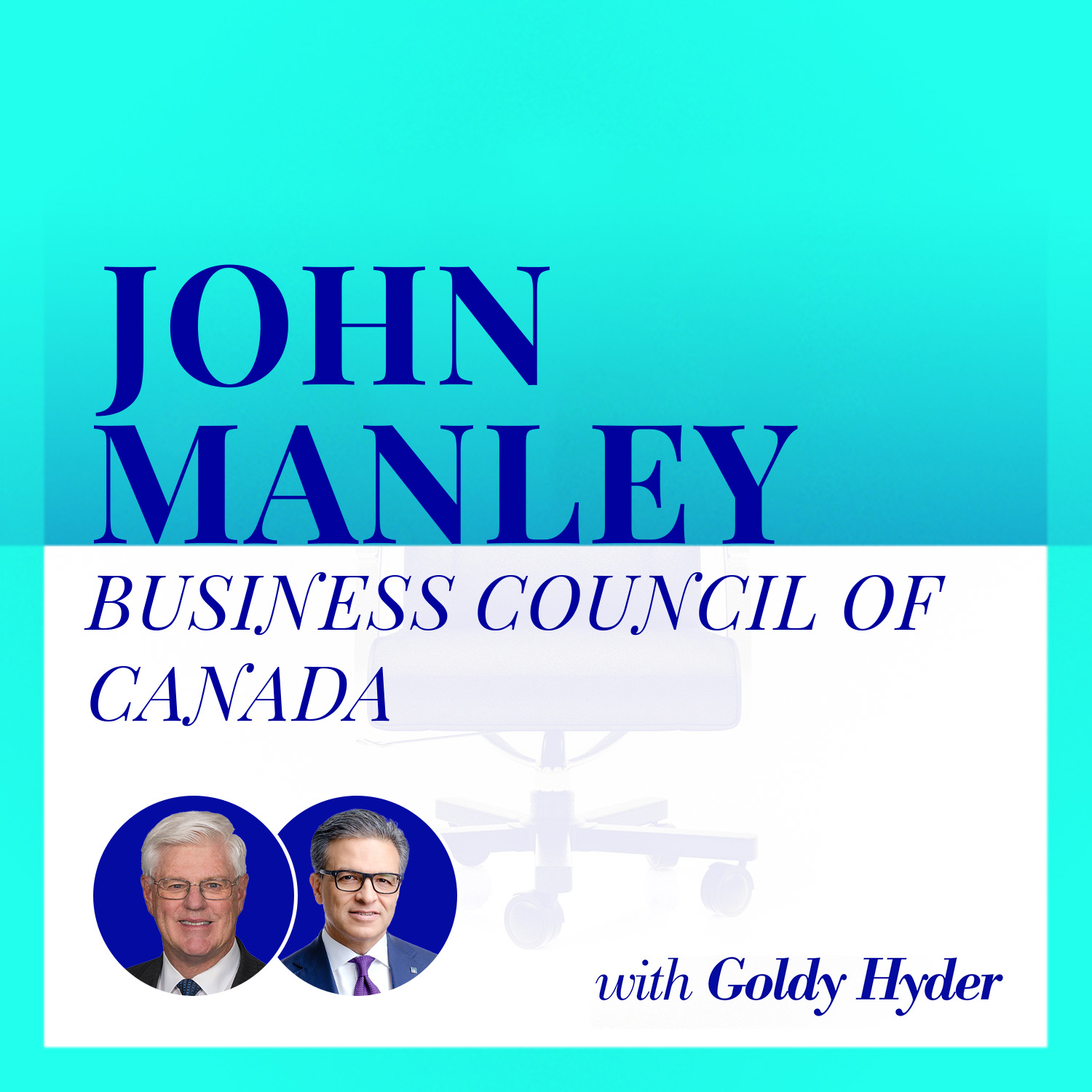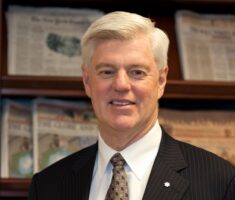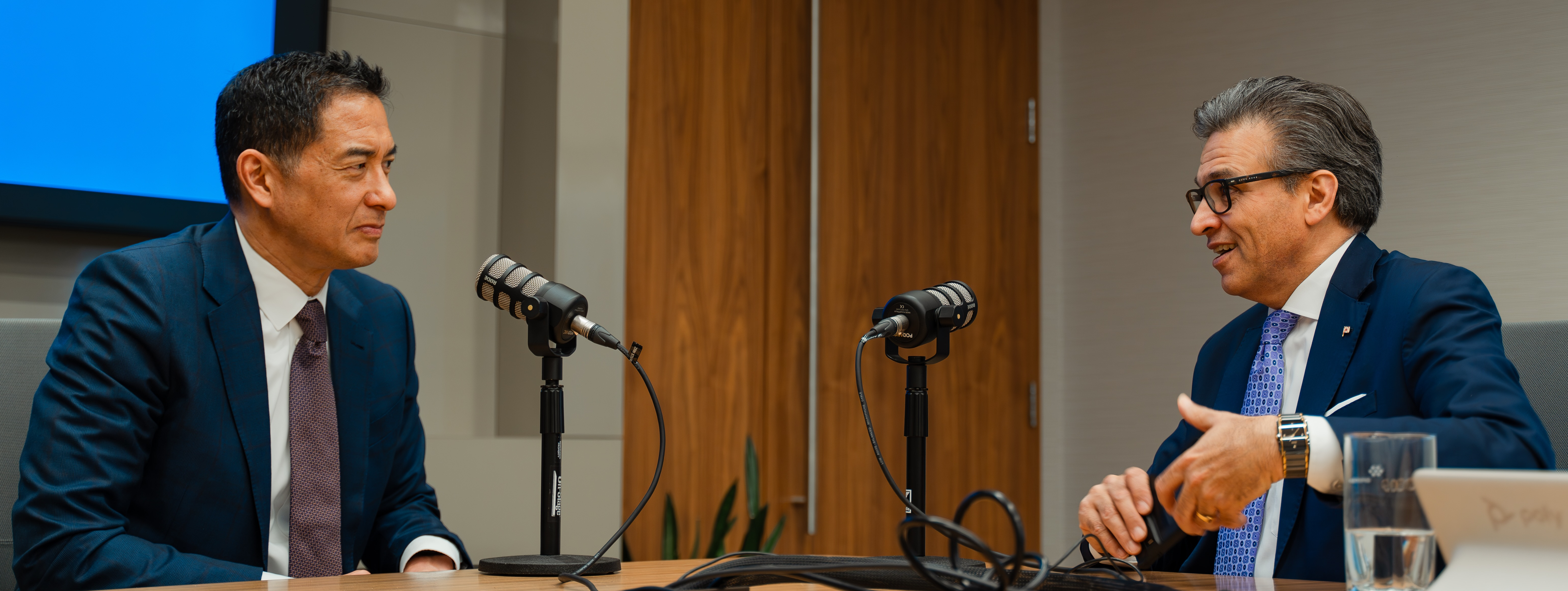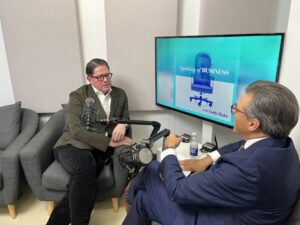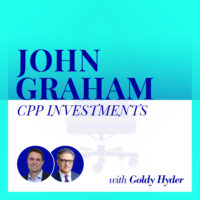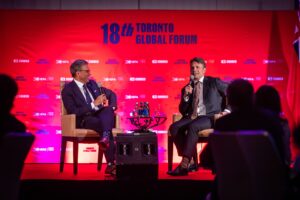John Manley is Canada’s former Industry Minister, Finance Minister, Minister of Foreign Affairs and Deputy Prime Minister. John recently stepped down after nine years as head of the Business Council of Canada. As you’ll hear, John’s commitment to his family, career, and public service in both politics and business are truly remarkable.
“We were all in this to get the best outcomes for Canadians and it didn’t really matter what colour tie you were wearing.”
John Manley
Goldy Hyder:
Welcome to Speaking of Business Conversations with Canadian Innovators, entrepreneurs and business leaders. I’m Goldy Hyder, president and CEO of the Business Council of Canada. Today I’m speaking with John Manley Canada’s former industry minister, finance minister, minister of Foreign Affairs, and Deputy Prime Minister. John recently stepped down after nine years in the job. I now hold as head of the business council. As you’ll hear John’s commitment to his family, career and public service in both politics and business is truly remarkable. Here’s our conversation. I hope you’ll enjoy. John, thanks so much for joining me.
John Manley:
I’m happy to be here.
Goldy Hyder:
How are you?
John Manley:
I couldn’t be better because the burden of responsibility has been lifted from my shoulders and put on yours.
Goldy Hyder:
Well, thank you. I think when I took the position at the business council, I knew I had big shoes to fill, but you know what surprised me the most? You’re a celebrity. I’ve been with you in the last 24 hours as we traveled around and pilot stops and says, thank you for your public service walking into this building here, or guy screams out, you don’t look like the guy who’s retiring. How does that feel after all these years?
John Manley:
Well, I’ve always thought as long as they wave with five fingers, it’s not so bad. So what I would say is anyone that says public service is a thankless task is wrong. I’ve had lots of thanks and lots of approbation from people. Now during an election campaign when your name is on the ballot, different rules apply and people will say anything to you, and some of it can be quite hurtful, I’d say. But the rest of the time I’ve found that Canadians have been very grateful for what they perceive to be a difficult job.
Goldy Hyder:
Do you think our politics has changed from the time that you entered it and where we are now?
John Manley:
Well, there’s different pressures for sure. I think the phenomenon of social media, which I didn’t have to deal with, has changed the dimensions quite a bit in my time, the more recent phenomenon was 24 7 news cycle, and that in itself changed the way the political game was played. So you no longer had to gear up for the deadlines that newspapers and electronic media had later in the afternoon. You were always on all the time. But I think social media is a whole other dimension. But the other thing, Goldie, that I think has changed a little bit is, and I always worries about becoming a curmudgeon and as one ages, but it just seems to me that the adversarial nature has become a lot more personal and a lot nastier. I had friends, I still have friends that were political opponents. They weren’t my enemies. I didn’t hate them.
We had a different point of view on some things, and truthfully in opposition, I was there for five years. You oppose because that’s your responsibility. But in fact, you probably agree with, I don’t know, 75% of what a government is doing because there’s not that wide a margin of difference over many things. And now I get the sense that it’s not just opposition in order to draw out the weaknesses or explain other points of view. It’s a bitter personal rivalry in which it’s all politics all the time. I think that’s really regrettable. I guess I preferred the notion that we were all in this to try to get the best outcomes for Canadians and it didn’t really matter what color tie you were wearing.
Goldy Hyder:
Would you run today knowing what you know?
John Manley:
Well, would I run today if I were 38 years old again, it’d be a different answer than it would be today.
Goldy Hyder:
Let’s say you are 38 years old. Would
John Manley:
You run? Well, I’ve talked about it with my kids, of course, and I wouldn’t encourage them to run.
Goldy Hyder:
Isn’t that sad?
John Manley:
It is because I do believe in public service. I remember being out in the car with my oldest daughter, so she was nine and we’re out driving around. She says, do you like your new job? I said, yeah, I really enjoy it. I’m getting to do really interesting things. And she said, you work more than you did in your old job. I said, yeah, probably I do. It’s long hours. And over the Christmas period that year, we had votes that went well into the night. She said, do you get paid more than in your old job? I said, well, actually, no, I get paid less. Then there’s a long pause and she says, why did you do this? Didn’t make sense. There’s a learning opportunity, teaching opportunity. I mean, I lived in as part of a government, which in some ways was charmed. I mean, I went into government out of opposition with Mr.
Cretien in 1993. He made me minister of industry. I held the job seven years. If you go over to what was Industry Canada to the innovation science and Economic Development Ministry and look at the pictures on the wall, there’s a lot of ’em. There’s all those various ministries, and my view is they should be sized according to how long you were there, because mine would be basically poster size and a lot of the others would be postage stamps. Because I was there a long time. Seven years I think is the longest since World War II that anyone’s been there. But in those seven years, I think the Prime Minister called me five times. I ran my department, I made decisions. Some of them were difficult, some of them were controversial. So I had free reign. I don’t think that happens anymore.
Goldy Hyder:
Let’s talk more about leadership. It’s certainly a passion of mine to learn from others. What have you learned from your political leaders that you’ve had, but also the fact that you’ve now had a line of sight into Canada’s business leaders for the last nine years?
John Manley:
Well, they come in all shapes and sizes, of course, and usually business leaders often don’t make very good political leaders. Why is that? They don’t? Well, because businesses, I know there’s a great anecdote about George Schultz who was renowned as being both the Secretary of State and the Secretary of the Treasury in the United States, so finance minister and foreign affairs minister like me, right? But he also ran a university and he also ran a major corporation, Bechtel Corporation, and he was asked one time, which was the hardest, he said, oh, its much harder to run a corporation. And the interviewer said, well, why is that? And he said, well, because unlike government or universities in a corporation, when you tell people to do something, they actually do it. So you’re responsible for it, but it gives you an idea of the structure. I mean, in the corporate structure, if you’re the boss, you make the decisions and people execute them in government, and I guess in universities, I’ve never worked in the universities.
It’s not quite like that. You have to build consensus, you have to get others to see things your way. You have to get things to work. I used to say taking a memorandum to Cabinet Forward was like organizing one of those races at a Sunday school picnic where everybody’s got their legs tied together and you’ve got to try to get them all moving in the same kind of sequence, otherwise everyone falls over it. It’s a little bit like that in government. It’s not intuitive for a business person who thinks they can go in and run it like a business. Well, running it like a business means that you just ignore what your colleagues, what stakeholders have to to say in many cases.
Goldy Hyder:
Let’s return to the leadership theme and talk about when you were growing up, who were the leaders that you admired? Who did you read about in so many fields? I read Churchill, but who were your folks that you looked up to and thought that’s leadership?
John Manley:
Well, I’d put it this way. I grew up in an Irish Canadian household where we couldn’t have dinner without having a discussion about politics, and my dad tended to support the liberals, and my mother tended to support the conservatives. I can remember they would sometimes even have both signs on the lawn. If you didn’t have a good argument over dinner, then what was the point of sitting together? And I think a lot of Irish families are a little bit like that.
Goldy Hyder:
Surprised you didn’t become an NDP-er in that house?
John Manley:
Well, I mean, some people on both sides say, I should have been the other way. I don’t know. But I think the underlying theme in those years, even though my parents might disagree, was that people in positions of political leadership deserved respect. This was public service, and they would never have said that the other side was not worthy of respect. So I grew up believing that public service was really an important thing. So my first awareness was Diefenbaker coming to Power and Lester Pearson being awarded the Nobel Prize, and then being the leader of the opposition and later being elected. In the days you’ll never forget where you were and what you were doing. I was writing my grade nine math exam on the 22nd of November, 1963 when JFK was assassinated. That was profoundly moving for me and for all of my contemporaries. I mean, that was a big, big event.
And then I went through high school and into university in the years of Vietnam. So it was a very politically active time. The day in 1968 that Pierre Trudeau was chosen leader of the Federal Liberal Party in April, 1968 was the weekend that Martin Luther King had been assassinated in Memphis and cities across the United States were going up in flames. And we had this shiny new leader that was intellectual and cool, and the US was going up in smoke, and it just felt like the action was important. The loss of important leaders in the United States stood in stark contrast to the emergence of this brilliant new leader in Canada. And weren’t we proud to be Canadians? Of course, that was just after Expo 67 and Canadian centennial as well. So it was to say I grew up in a political environment even though nobody in my family ever ran for office would be an understatement.
Goldy Hyder:
So why did you run when that day came, you said, I think I’m going to do this. What motivated you to do it?
John Manley:
Rocking chair test. I had this notion, Goldie, that you don’t regret the things you did as much as you regret the things you didn’t do. And there I was a liberal sympathizer, I’d say more than a liberal partisan. And Brian Mulrooney had a massive majority, and I practiced law for 10 years. I had a family, I had three children. They were when I was first elected, nine, six, and one. But I thought, I don’t want to be sitting in my rocking chair one day thinking I always wanted to try that. I wonder what would’ve happened if I’d done it. And so when the massive conservative majority means that there are nominations that you can try to get, and that’s in Canadian politics, I’ll tell you by far the hardest things to get a nomination. Once you’ve got a nomination, well then it’s the national campaign that’s going to carry you in or cause you to lose.
So I thought, well throw my hat, the ring. And I worked hard and I sold memberships and all the things that you do. It’s very, very grassroots. Got all my friends and colleagues to volunteer. And surprise won a nomination in that election. Ottawa South was a new constituency. I remember the financial post ran a special segment on Ottawa South, and they featured it because they thought it was a really interesting contest between an incumbent conservative Barry Turner and a union leader, very prominent union leader named John Friar. They wrote the whole article, didn’t mention the liberal candidate. So I felt pretty good on an election day when Friar didn’t get 15% of the vote and I won. I had more than half the votes the first time out, but was, to me, it was an opportunity to be in public service.
Goldy Hyder:
So is John Manley‘s life one that’s been lived without regret?
John Manley:
Oh, no. Are you kidding? I mean, I’ve got lots of mistakes and lots of things that’s
Goldy Hyder:
Different. Regrets and mistakes are different. Any regrets
John Manley:
Well, regrets. I wouldn’t say major regrets, no. In some ways I look back, it’s not over by the way. It’s not a retrospective, but it’s not over. But I don’t look back on my life experiences as being things that I regret. I mean, there were opportunities. I mean, I had great opportunities, some of which I didn’t follow. I was a law clerk to the chief justice of Canada. I could have gone to Harvard or to Oxford or something. And at that time, my life, I’d really had my fill of school and decided not to kind of wish I’d done one of those things. But I don’t put that in the category of great regrets. I’ve had a really wonderful experience. I have three kids who are all married and in careers of their own. None have ever called me from the jail.
Goldy Hyder:
You’re a good dad.
John Manley:
You’d have to ask them that.
Are you a good dad?
They would robably say their mom was a good dad because so many of those years I had to be absent, and Judith had to really keep things together. And they had dinner at home. They’d say, where’s dad tonight? And she’d say He’s working for Canada. So she deserves a credit for them.
Goldy Hyder:
How important has her role been in your life?
John Manley:
Well, she’s a rock, right? She’s totally reliable. She has foregone. I mean, she’s a smart woman.
Goldy Hyder:
But you held it together. I mean, so many marriages fall apart when you enter public life, it feels like. But you guys are an example of getting it right. Your family’s solid family. You and Judith are in great place.
John Manley:
Well, what I tend to say is, well, some people have lived together a long time, had married less. In our case, we’ve been married for 45 years and we’ve lived together for 20. So maybe that’s what works. Distance
Goldy Hyder:
Makes the heart grow fonder, is it?
John Manley:
Yeah. But as I say, I mean, she’s smart. She’s got opinions. She knows lots of things, and she basically forwent all of the opportunities that she could have pursued. She was a feminist before I’d ever heard the word, but she took the backseat so that I could do lots of neat things. And I don’t think she regrets it, but I think that mean she had to set her expectations at a certain level in order to give our family what she believed was essential. Not everybody makes the same choice in those circumstances, but in our case, she stayed home and they say the notion that the a parent needs to be around when the kids are little. I think that’s probably true. But you know what? When they’re getting into their preteens and teens and those hours when they get home from school, that’s when you find out what’s really going on. And I think that she had that special intuition to know what was going on in each of their lives. And it’s not always easy with pre-teens and teens, but we got through it all.
Goldy Hyder:
Now in politics, they often say that you need to have a counterbalance. And in many cases, that is your spouse. It doesn’t have to be prime ministers like to have what they call a kitchen cabinet, people that they can speak to and reach out to just to get a reality check. Did you have that?
John Manley:
Well, to a great degree. I did, yes, for sure at home. And also I spent a lot of time.
Goldy Hyder:
Tell us more about that though. Did Judith ever say to you, John, I watched you today, and that was an embarrassing performance and question
John Manley:
Period? No, she would never do that. She wouldn’t do that. She’d never be negative, but she would ask about things and how we were explaining them, but she was always supportive.
Goldy Hyder:
Now, we’ve talked about how politics often came at great sacrifice, but you weren’t a politician. 7/24. John Manley is still a person. How did you pass your time and how did you unwind from a really difficult day? What did you do?
John Manley:
Well, in my years in government, I actually took up running in a serious way.
Goldy Hyder:
Not for office, you mean, but not
John Manley:
For office. I ran for office too, but I had a staff member, Dan Wemay, who was a very avid runner and university competitive and stuff, and talked to him one day, but he said, well, let’s get a good pair of running shoes, and I’ll give you some tips and things. I said, I’ve always had this notion that I’d like to run a marathon. And I think he kind of rolled his eyes and said, he got me this website, hal higdon.com, and I followed it religiously, and I celebrated turning 50 by running my first marathon here in Ottawa. And it turned out to be a really good thing to do as a minister because it gave me time when I was running to think through things with nobody throwing anything at me.
And the thing about a minister’s job is that you’re never alone. There’s always, even when you’re in the car, somebody’s driving you and there’s staff with you, and there are people that want things, and your calendar is full from early morning till late at night. And when I got out for a run, I was alone. Now, there were times when I had to have security, but not often in Canada. And over the course of those years, I ran five marathons. I ran some halves and 10Ks and just had a great experience of it. It kept me healthy, it gave me time to think, and it was a release from the pressure from the stress.
Goldy Hyder:
We’ll come back to the hobbies. I want to ask about that, but you just said something I want to pick up on. You had to have security. Why?
John Manley:
I had security when I was foreign minister, and there was a war going on in Afghanistan, and I had security when I was Deputy Prime Minister and somewhere on the road, and I often thought it was,
Goldy Hyder:
Were there any threats against you?
John Manley:
Well, they don’t tell you if there are threats,
Goldy Hyder:
But when security arrived, did you feel like, wow.
John Manley:
Yes. It was very intrusive. And it was things like, please don’t leave your house unless you call us in advance. They didn’t want to have somebody park there all the time, but they didn’t want me going out to buy the groceries
For a run, they’d have an officer on a bicycle that would, sometimes two that would come along with me. And I remember one time I was in Vancouver and I was going to run the seawall, and I had this RCMP officer, Marie Claire was her name, and I said, look, I’m going to have all my gear on hats, sunglasses. Nobody’s going to recognize me and who’s, what are they going to do to me anyway? And she said, oh, I’m really sorry, but I have to go with you besides, you just never know. So we’re going down that first turn past, I think it’s the West, into Stanley Park, and somebody running the other way, and I’m totally geared up, right? Sunglasses hat down, guy running the other way says, good morning, Mr. Manley. And I hear the RCMP officer over my shoulder saying, see, I told you. I said, he didn’t try to attack me. He just said, good morning.
Goldy Hyder:
Well, one of the things about being a minister or being a CEO is it’s a job title, but then you come home and your dad, your husband, your grandpa, what was that like? And the reality check that comes when it says, you may be the minister, but I still need the garbage taken out.
John Manley:
Well, actually, what we did in our household is we referred to the minister in the third person, because when I was at home, I was not the minister. The minister was somebody. The minister had a car, the minister had an office. The minister brought briefcases in, but I was not that. I was not that persona. He was left at the door. Yeah. Yeah. And I mean, every Saturday morning I made breakfast, and yes, I took the garbage out. That was one of my things until I could bribe my children to do it, which is not easy to do. Caught. Tell me about it. Grass. I’m not a very good gardener. I remember one time I was deputy prime Minister. I’m standing out on my front lawn in Alta Vista in Ottawa, and it’s a mess. I think we had some kind of white grub infestation or something. And I’m trying to figure out, and my neighbor next door calling comes over and we’re standing there looking at this scene of Des Station. It looked like it had been a nuclear waste site or something. And he says, tell me, does the vice president of the United States have a lawn that looks like this?
I said, no. And he doesn’t cut his own grass either. Sure.
Goldy Hyder:
You set a goal for running a marathon and you did it. Are there any more marathons in your future?
John Manley:
Well, the next thing I did after the marathon was because I had an injury, which inhibited my running, which I regret a lot. But anyway, I climbed Kilimanjaro as a fundraiser for Care Canada, which is an international relief charity that I was involved with for many years. And I loved it. It was an extraordinary experience. The only regret that I had was I thought my kids really need to see this. So I started talking to them about, would you be interested in doing this? And of course, they all said they would. And it took a few years. And then my two girls said at one point they said, look, it’s a great idea, but our biological clocks are ticking here, and if we don’t do this soon, then we’re going to run out of time. Because you can’t take kids up on Kilimanjaro until they’re 10, at least. So we found a time, it was over at Christmas, it 2013, and my three kids, two girls and a boy and their partners and two other friends and me made a group. And we went to Kilimanjaro and we climbed to the summit. And it was the most extraordinary experience. I mean, you get your adult kids for nine days with no phones.
Goldy Hyder:
There’s the magic right there,
John Manley:
Nothing to do, but walk and talk and eat and sleep. And in this remarkable environment, because you climb Kilimanjaro, you go through seven different distinct climate zones. It’s everything from tropical rainforest with monkeys hanging in the trees through to the Heather districts.
Goldy Hyder:
What’s your best memory from there?
John Manley:
Getting down? No one of, there were many great memories. I mean, we just had a wonderful time together, and it was over Christmas and our guiding company decided, they called me a few weeks in advance of the trip and said, does your family celebrate Christmas? I said, oh, yeah, it’s kind of a big deal in our household. So they made every effort, they had stockings on our tents on Christmas morning, they had one of the porters who was a very, very dark African, and a very, very thin man wearing a Santa outfit. They sang Christmas songs to, as the porters did, they made an exception and had a little bit of rum in the eggnog even for us. So they made a special event of it. So that was very memorable,
Goldy Hyder:
The best of humanity at work,
John Manley:
Because I was clearly the senior of the group in Swahili. They called me Babu.
Goldy Hyder:
Babu, yeah.
John Manley:
Yeah. So in fact, my girl’s concerns proved warranted because within a year of our descent, I had two grandsons in search of an appropriate grandfather name. They settled on Babo because it’s Kilimanjaro connection. So that’s an ongoing legacy.
Goldy Hyder:
Well, speaking of ongoing legacies, Babu, to me, when you run a marathon and you climb Kilimanjaro and do things like that, it can really help you prepare for adversity in your life. Have you had adversity in your life, and how did those experiences help you?
John Manley:
Well, if I could take the year 2017 out of my life, the answer would be pretty much no.
Goldy Hyder:
But we can’t.
John Manley:
We can’t. So we have a cottage in the Rito Lakes, halfway between, roughly halfway between Kingston and Ottawa. And it’s not a long time family cottage. I couldn’t afford a cottage when I was in public life. But after I was out, we bought this place in 2006 and it became a family place, a gathering place. We were there a lot. And we went for New Year’s in 2016, December 30th, we were up. There was like many families, it wasn’t the manly Christmas, it was the in-Laws Christmas. So we had everybody for Christmas over New Year’s and December 30th, I went to bed and was sound asleep when my son-in-Law started calling out that there was a fire. So I got up and saw that this was not anything that my little hand operated fire extinguisher was going to deal with. And I called out to everybody, get dressed and get out and grab anything you think is valuable on the way.
We had five minutes to get out, and the place was engulfed cold winter day. It was about minus 20 outside. We had six adults, one of the grandsons, two years old, and a dog. We got everybody out, grabbed a few things off the walls. Somebody even opened the refrigerator and grabbed the Turkey, threw it out in the snow, and then we just washed it burn down. So that was December 30th, 2016. Then takes a few months for the insurance company to do all their, excuse me, to do all of their evaluations. And the day that they had given the clearance and the equipment was there to begin the demolition, the whole thing had to come down. All that was left was the foundation. The day the demolition began, my sister died. She was my older sister, my only sibling, and she died of liver disease that had been caused by a condition called hemochromatosis, which is too much iron in the blood.
So then I go to my doctor and says, I’ve been reading about this hemochromatosis, hereditary effects. Should I be tested? He said, I don’t think you’ve got a hemochromatosis from your blood test, but I’ll send you to a hematologist. I got a hematologist. He says, eh, same thing, but let’s get an ultrasound and see what’s going on in your liver. So May 1st, 2017, I get an ultrasound May 2nd. I called and said, your liver looks just fine. You got a mass on your kidney. We got to check it out. So it turns out I have two tumors on my left kidney, and next thing I know, we’re scheduling surgery to remove a kidney. Fortunately, kidneys come in pairs and there’s built in redundancy. So I can function just fine with one, getting lots of monitoring. But I’d say, have I dealt with adversity? That was not my finest year between the fire and the loss that entailed my sister and the cancer diagnosis. That’s not my best year.
Goldy Hyder:
Well, they say adversity builds character, and it’s clear that that’s happened.
John Manley:
I’m still here, and I have a whole enhanced appreciation for good health that I wouldn’t say I ever took it for granted, but I never was sick. I never even had symptoms from the cancer, plenty big tumors but so far I had no symptoms. So sickness is not something that I’ve ever been able to really compute for myself other than the odd, cold or flu or something. So it’s not bad experience to know what it’s like to come
Goldy Hyder:
Out the other side
John Manley:
And to be in a hospital bed and to see what happens on the inside of our healthcare system. I’ll tell you, I know there’s lots of griping, complaining, and I think if you’ve got elective surgeries or other special treatments, it can take a long time. But when you’ve got something serious, oh man, our system is good.
Goldy Hyder:
That’s when it really works.
John Manley:
As I like to say to my American friends, it was fast, it was efficient, it was very good. And the only thing I had to pay for was parking at the hospital. Now, that was not inconsequential. I might add, but that’s all I paid.
Goldy Hyder:
Now you’ve had an interesting perch and somewhat of a hybrid in the golf bag, if you will. You’ve seen the political side. You’re getting a line of sight into the business side. There’s often a tension between our political folks and our business community. Are they really that different?
John Manley:
What are the things that I think that my political colleagues when I was there would not have appreciated? As much as I’ve learned it to be the case is the degree to which our senior business leaders, members of the Business Council of Canada really do want to see Canada succeed. Now, they all lead big businesses. They’re all very competitive. They’re all very well compensated, as everybody will know. But they are philanthropic. They are community leaders. They give time, which is something they generally don’t have to community and other causes, and they really do believe in Canada and in Canadian success. So I think one of the great things about serving at the business Council has been when we’re advocating for good public policy that supports economic growth, it’s always from the context of not how do we make a certain class of people rich. It’s about how do we make Canada a better place for us and for our children and grandchildren? And that is not an attitude that most political actors attribute to business leaders. I think this is maybe unfair to some, but they tend to think that they are self-centered and greedy.
Goldy Hyder:
I’ve heard you describe the role that you played at the Business Council is one of an interpreter of trying to help build a bridge between business and government. What advice do you have for me as we go forward and how to continue to be that interpreter?
John Manley:
I think a good starting point is to say we we’re not here to oppose government. We’re here to work with government. And I think that to be constructive is way more valuable than to be critical. Now, sometimes you have to be critical and sometimes they’re really not listening, and sometimes if you’re not critical, they interpret your lack of criticism as acquiescence. So it’s a bit of a tricky thing. But I think that our role has been historically one of not just advocacy, but thought leadership. Because generally speaking, all Canadians believe that they want to see our economy grow. They want to see good jobs. They want to see incomes rise. They want to alleviate poverty. They want to see good health, they want to see a clean environment. They want to see us play a constructive leadership role in the world. And those are things that business leaders and political leaders agree on. So we’ve got lots of common ground to work with, and I would focus on the common ground before I focused on the things on which we find we must disagree.
Goldy Hyder:
Do you have concerns about our economy? Do you have concerns about rising deficits debt? I mean, you were finance minister.
John Manley:
You know what? I worry. But when you look at our overall debt level in Canada at the federal level, it’s not worrisome, I don’t think, under
Goldy Hyder:
Low interest rate environment, maybe not, but they’re going the other direction.
John Manley:
It’s a low interest rate, but also our debt is a percentage of our GDP isn’t bad it’s way, but
Goldy Hyder:
Who talks like that? John, at the dinner table? Do you think anybody talks like that?
John Manley:
Hold on. So I think that there are, that’s sort of what the government says to us, right? So don’t worry, be happy. But what worries me is that over the last number of years, we have seen deficits growing way faster than the economy is growing. I’ve seen that movie. And then as you say, interest rates start to rise and oh, the low cost debt suddenly is becoming more expensive. And oh, by the way, people like getting all those goodies. And all of a sudden we’re in a situation where the economy slows for global. It could be global reasons and growth slows and government revenues slow, but the expenditure base remains the same. In fact, it grows because of employment insurance benefits and other offsets. So suddenly what was a manageable deficit and a relatively low debt is growing exponentially and really fast, and it’s really hard to do anything about it.
When the great recession hit in 2008, the federal government in Canada had run 12 consecutive surpluses. We were a paradigm of virtue in fiscal terms. So the Canadian government, and I give the Harper government credit for this, open the taps. Our stimulus in Canada in absolute numbers, not relative numbers, was the fourth largest in the world like our military was after World War ii. It was big. We spent a lot of money and we basically, we didn’t come out unscathed, but we came out a lot better than most of the world, our highly regulated financial institutions. None of them required bailout by the government. No federal money flowed to them. It flowed to infrastructure and other things. Central banks did what they did, most of them. This gets a little technical. Most of ’em expanded their balance sheets by doing something called quantitative easing. Didn’t do it in Canada, didn’t need to lower the interest rates.
But the Bank of Canada wasn’t outboard buying government debt or buying corporate debt as other central banks, including the Federal Reserve were doing. We came through that really well. Why? Because we’d run 12 surpluses in good times so that we had our cupboards full when bad times came. What are we doing now? We’re in good times and we’re pouring the money out the door. So I just think that’s a prescription for disaster and whoever’s in government when the turn comes, because they will come, they’re going to have some challenging things to decide. Something I worry about when people talk about the economy and they say, highest ever or lowest ever, I figure it’s time to run for the hills because you know what? Trees do not grow to the sky.
Goldy Hyder:
Well, speaking of running for the hills, as we wind up, I thought I’d play a little word game with you. I’m going to give you one word and you’re going to give me the first word that comes to mind. Trump
John Manley:
Tower
Goldy Hyder:
Putin,
John Manley:
Poison
Goldy Hyder:
China
John Manley:
Opportunity,
Goldy Hyder:
Chretien
John Manley:
Pragmatism,
Goldy Hyder:
Harper
John Manley:
Ideology,
Goldy Hyder:
Social media
John Manley:
Opportunity.
Goldy Hyder:
Judith,
John Manley:
I love her. That’s three words.
Goldy Hyder:
How about Canada?
John Manley:
I love Canada. We all focus on what, especially in the jobs that I’ve had and that you are entering, what can we do better? So sometimes that sounds like criticisms, but there’s nobody living here that was either born here or that immigrated here that didn’t win the lottery. This is still the greatest place on earth,
Goldy Hyder:
Well, you’ve made it a better country through your service, John, and I know there’s more that lies ahead for you. I can’t tell you what a privilege and an honor it is to try and fill your shoes. You’re leaving behind a great organization with a great team and a really solid membership, and I think you’ll be happy to know that we’re all going to work very hard to keep Canada strong. Thank you.
John Manley:
Thank you.
Goldy Hyder:
Thanks again to John Manley for being my guest on this episode of Speaking of Business. Subscribe now for more conversations with Canada’s top innovators, entrepreneurs, and business leaders. Search speaking of business, wherever you find podcasts, or visit speaking of biz.ca to join our email list and follow us on social media. Until next time, I’m Goldy Hyder.





